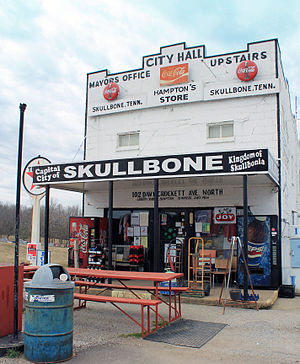Gibson County, TN
| Gibson County, Tennessee | |
|---|---|

Skullbone Store in Skullbone, Tennessee.
|
|
|
Location in the U.S. state of Tennessee |
|
 Tennessee's location in the U.S. |
|
| Founded | 1823 |
| Named for | John H. Gibson |
| Seat | Trenton |
| Largest city | Humboldt |
| Area | |
| • Total | 604 sq mi (1,564 km2) |
| • Land | 603 sq mi (1,562 km2) |
| • Water | 0.9 sq mi (2 km2), 0.2% |
| Population | |
| • (2010) | 49,683 |
| • Density | 82/sq mi (32/km²) |
| Congressional district | 8th |
| Time zone | Central: UTC-6/-5 |
| Gibson County Sheriff's Department |
|
|---|---|
| Agency overview | |
| Legal personality | Governmental: Government agency |
| Jurisdictional structure | |
| Operations jurisdiction* | County (United States) of Gibson in the state of Tennessee, United States |
| Size | 604 sq mi |
| Legal jurisdiction | As per operations jurisdiction. |
| General nature | |
| Operational structure | |
| Agency executive | Paul Thomas, Sheriff |
| Facilities | |
| Stations | 1 |
| Jails | 1 |
| Footnotes | |
| * Divisional agency: Division of the country, over which the agency has usual operational jurisdiction. | |
Gibson County is a county located in the U.S. state of Tennessee. As of the 2010 census, the population was 49,683. Its county seat is Trenton. The county was formed in 1823 and named for John H. Gibson, a soldier of the Natchez Expedition and the Creek War.
Gibson County is located in what was known as "Indian Land": territory that was legally occupied by Chickasaw Native American people. The Chickasaw Cession, proclaimed on January 7, 1819, eliminated those rights and opened the region for settlement and exploitation by white settlers and speculators.
Soon after the Chickasaw Cession, the first log cabin in what was to become Gibson County had been built by Thomas Fite about eight miles (13 km) east of present-day Trenton. From 1819 the area was part of Carroll County but, as settlement progressed, citizens petitioned for the formation of a new county. The county was established by private act on October 21, 1823 and was named in honor of Colonel John H. Gibson who had died earlier that year. Gibson was a native of Bedford County, Tennessee who was commissioned Lieutenant in the Tennessee Militia; he took part in the War of 1812, the campaign to Natchez of 1813, and fought in the Creek Wars of 1813.
In its early years, Gibson County grew rapidly, chiefly because the land had less dense forest growth than some adjacent areas and was therefore more easily prepared to farm cotton and corn. By the end of 1824, the county had 273,143 acres (1,105.37 km2) of taxable land. The county's first cotton gin was built in 1826.
According to the U.S. Census Bureau, the county has a total area of 604 square miles (1,560 km2), of which 603 square miles (1,560 km2) is land and 0.9 square miles (2.3 km2) (0.2%) is water.
...
Wikipedia
